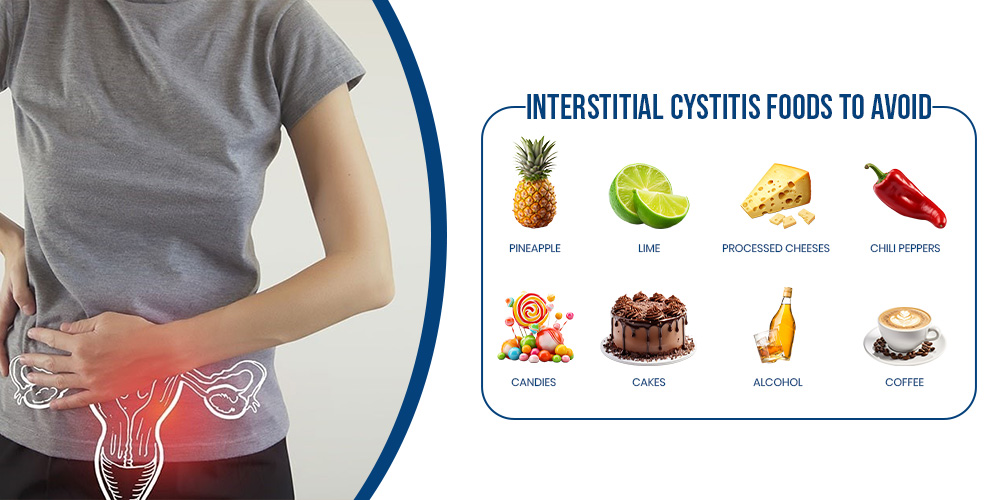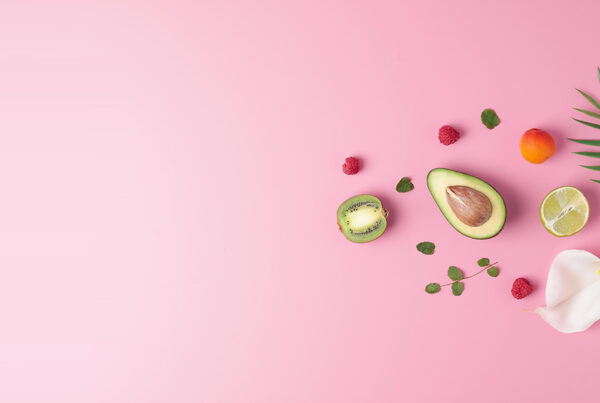Last Updated on May 21, 2024
Introduction
Interstitial cystitis, characterized by persistent pelvic discomfort and bladder movement problems, often necessitates the avoidance of specific foods to effectively manage triggers. These may include foods high in spiciness, acidity, or alcohol content. The exact cause of interstitial cystitis remains unknown, and its prevalence is not clearly defined. Factors such as inflammation, autoimmune disorders, and bladder scarring are believed to contribute to its progression.
Additionally, individual differences may vary, and multiple factors could influence the condition. Given this variability in symptoms, there is no one-size-fits-all diet or list of interstitial cystitis foods to avoid. However, certain foods may trigger symptoms and flare-ups in some individuals. Those experiencing worsened symptoms after consuming certain foods can find relief by eliminating them from their diet.
This article explores various foods that individuals with interstitial cystitis may avoid and suggests alternatives that may be suitable for their diet.
Interstitial Cystitis Foods to Avoid
1) Do Not Consume Acidic Fruits
Research indicates that consumption of certain acidic fruits may result in the disruption of the normal pH balance of urine, which may lead to increased acidity. This heightened acidity in the urine can irritate the bladders wall, further elevating interstitial cystitis symptoms.
Interstitial cystitis foods to avoid: The following fruits, known for their acidic nature, can worsen symptoms associated with interstitial cystitis.
- Pineapple
- Limes
- Tomatoes
- Lemons
- Kiwi fruit
- Orange
- Strawberries
2) Avoid Dairy Products
For individuals with lactose intolerance or milk allergy, consuming milk and dairy products can be alarming and may trigger interstitial cystitis. The Urology Care Foundation (UCF) recommended the following interstitial cystitis foods to avoid:
- Chocolate-flavored ice cream
- Yogurt flavored with lime, lemon, orange, or chocolate
- Processed cheeses
- Soy-based products
3) Avoid Certain Vegetables
Similar to certain fruits, individuals may also need to eliminate certain vegetables from their diet if their symptoms of interstitial cystitis are worsening.
The following vegetables have the potential to increase the symptoms and must be avoided:
- Chili peppers
- Sauerkraut
- Pickles
- Onions
4) Do not Consume Artificial Sweeteners & Various Additives
Numerous products incorporate artificial sweeteners and additives, such as monosodium glutamate. However, these refined sugars food in various foods can increase the condition. One may take into consideration interstitial cystitis foods to avoid:
- Candies
- Cakes
- Ice cream
- Baked goods
- Protein powder
- Sweetened beverages
- Processed meats
- Fast food
5) Beverages to Avoid
According to a study, there are certain ingredients in beverages that have the potential to irritate the bladder, stimulating local nerve endings and sensitizing pain receptors. Acidic fruit juices like orange, pineapple, and grape juice, recognized for their acidity, may increase interstitial cystitis symptoms like acidic fruits.
Furthermore, individuals with interstitial cystitis may consider moderating their intake of the following beverages:
- Alcohol
- Tomato juice
- Energy drinks
- Cranberry juice
- Coffee
- Carbonated beverages like soda
- Coffee
- Chocolate milkshakes
- Energy drinks
- Some types of tea
6) Certain Condiments and Spices
These found in cooked dishes must be avoided since it can activate nerve endings in the bladder, potentially leading to irritation and triggering symptoms of interstitial cystitis. Foods incorporating these ingredients may not be suitable for individuals with this condition. Avoid using these in your food:
- Chili
- Vinegar
- Ketchup
- Soy Sauce
- Horseradish
- Salad dressings
- Worcester sauce
Interstitial Cystitis Foods to Include
ICA suggest including the following food and beverages in diet with interstitial cystitis:
| Vegetables | Asparagus, beets, bell peppers, broccoli, Brussels sprouts, cabbage, carrots, cauliflower, celery, eggplant, green beans, mushrooms, peas, potatoes, radishes, spinach, squash, turnips, zucchini, and beans |
|---|---|
| Fruits | Apricots, apples, avocados, bananas, blueberries, cucumbers, dates, melons, pears, prunes, and raisins |
| Grains | Rice, and oats |
| Beverages | Water, chamomile tea, and peppermint tea |
| Proteins | Eggs, nuts, fish, lean meat, and poultry |
However, it is crucial to realize that interstitial cystitis foods to avoid or to consume may vary between individuals.
Tips for Dining Out while Having Interstitial Cystitis
Dining out in this condition can pose serious challenges due to uncertainty about ingredients. However, there are certain strategies that can be adopted to ease the difficulty:
- Prioritize planning by reviewing menus in advance.
- For social gatherings, consider preparing a dish that best aligns with your dietary needs and bring it to share with others.
- Do not hesitate to request modifications, such as opting for a burger with “no seasoning.”
Also read: Interstitial Cystitis Self-Care Tips
Summary
Interstitial cystitis can be easily exacerbated by specific dietary choices, so it is essential to identify and avoid triggers for symptom management. Certain foods to avoid include acidic fruits, dairy products, vegetables, and items containing artificial sweeteners and additives. Additionally, beverages such as alcohol, coffee, and acidic fruit juices can irritate the bladder. Moreover, condiments and spices like vinegar and soy sauce should be limited to manage symptoms effectively. Seeking guidance from healthcare professionals is crucial for individuals with this condition. One option is to explore Revive Research Institute’s Clinical Trials, as we are deeply committed to promoting women’s healthcare. In alignment with this mission, we are actively engaged in clinical trials focused on interstitial cystitis, aiming to empower women in effectively managing their symptoms.





